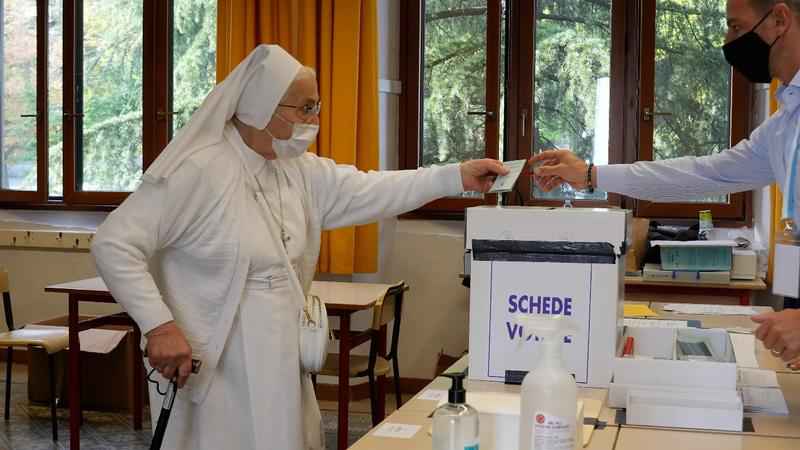San Marino voters overwhelmingly back legal abortion

A nun casts her ballot for the abortion referendum at a polling station in San Marino, Sunday, Sept. 26, 2021. Tiny San Marino is one of the last countries in Europe which forbids abortion in any circumstance — a ban that dates from 1865. Its citizens are voting Sunday in a referendum calling for abortion to be made legal in the first 12 weeks of pregnancy.[Antonio Calanni/Associated Press]
Residents in the tiny republic of San Marino voted overwhelmingly Sunday to legalize abortion, rejecting a 150-year-old law that had criminalized it and becoming the latest majority Catholic state to approve the procedure under certain circumstances, according to nearly complete returns.
With 26 of 37 polling stations counted, some 76% of voters approved making abortion legal in the first 12 weeks of pregnancy. It will also be legal beyond then if the woman’s life is in danger or if her physical or psychological health are at risk because of fetal anomalies or malformations, according to official returns broadcast on San Marino TV.
Turnout was 41% of voters of San Marino, a microstate of 33,000 people surrounded by Italy.
THIS IS A BREAKING NEWS UPDATE. AP’s earlier story follows below.
SAN MARINO (AP) — Residents of San Marino, a tiny republic surrounded by Italy, voted Sunday whether to decriminalize abortion, with the Roman Catholic Church firmly opposed and the “yes” camp hoping to make the procedure legal in some circumstances.
The ballot proposal calls for abortion to be made legal in the first 12 weeks of pregnancy and beyond then if the woman’s life is in danger or if her physical or psychological health are at risk because of fetal anomalies or malformations.
At the close of polls, 41% of registered voters had cast a ballot, more than half of them women, according to San Marino TV. Results were expected late Sunday.
San Marino, one of the world’s oldest republics, has a population of about 33,000 and is one of the last European states that still criminalizes abortion. The referendum was set after around 3,000 people signed a petition drive to overturn the microstate’s abortion law, which dates from 1865. If “Yes” votes prevail, San Marino’s Parliament will need to legalize the procedure.
Women in San Marino seeking an abortion usually go to neighboring Italy, a similarly Catholic country which legalized the procedure in 1978. But proponents of the referendum say that puts an undue financial burden on them and penalizes women who have gotten pregnant as a result of rape.
Opponents argue that in San Marino, even minors can receive free contraception at pharmacies, including the morning-after pill.
Voter Federica Gatti said Sunday as she cast her ballot that a woman’s decision to terminate a pregnancy or not involves “several personal, religious and moral reasons,” but that the state “must provide its citizens this opportunity.”
Another voter, Elisabetta Matteini, said she was against having the procedure personally since it took her a long time to conceive her son, but said it should be available to avoid women resorting to “people who have no competence, putting their life at risk.”
In the buildup to the vote, the bishop of San Marino, Monsignor Andrea Turazzi, said the Catholic Church was “decidedly against” the decriminalization initiative, though he said the campaign had raised awareness about the need to provide better services and care, especially for mothers in need.
The Vatican firmly opposes abortion, holding that human life begins at conception and that all life must be protected from conception until natural death.
“For us, its inconceivable that a mother resorts to abortion because of some economic troubles,” he told Vatican News.